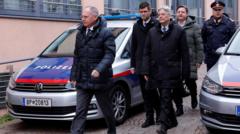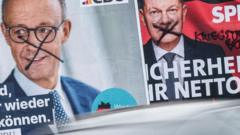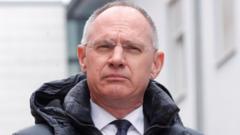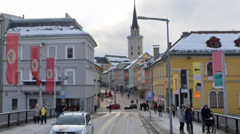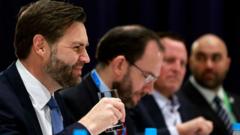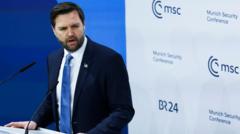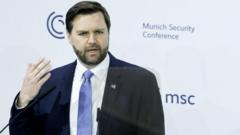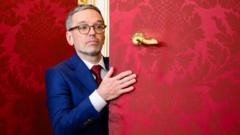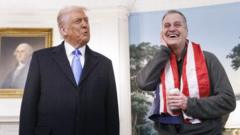The recent failure of coalition talks in Austria signifies a crucial moment in the nation's political landscape, particularly in the context of rising far-right sentiments and their potential impact on governance and policy-making.
Austrian Coalition Negotiations Stalled, Delaying Far-Right Leadership

Austrian Coalition Negotiations Stalled, Delaying Far-Right Leadership
Disputes over key ministries lead to failure in forming government, keeping far-right Freedom Party from power, temporarily.
In a significant political development, Austria’s efforts to form a coalition government led by the far-right Freedom Party (FPÖ) came to an abrupt halt on Wednesday due to unresolved disagreements over significant ministerial roles, especially the Interior Ministry. These negotiations involved the Freedom Party, under the leadership of Herbert Kickl, and the conservative Austrian People’s Party (ÖVP). The collapse of talks raises questions about the future of Austrian governance following the FPÖ’s strong electoral performance.
In the elections held in September, the Freedom Party received 29% of the vote, a notable achievement that positioned Kickl as a frontrunner for the chancellorship. However, four months of negotiations have failed to yield a workable coalition, demonstrating the complexities of Austrian political alliances and the challenges posed by ideological divides.
Previously, attempts by three centrist parties to keep the Freedom Party from being part of the government had also faltered. The current impasse arose from conflicts over immigration policies and national security, crucial areas where the Freedom Party sought influence. Kickl's firm request for the Interior Ministry reflects his party's ambition to enact a stringent anti-immigration agenda. Nevertheless, the ÖVP's concerns about the potential ramifications of a far-right grip on national security, including risks to international intelligence cooperation, ultimately led to the breakdown of talks.
Christian Stocker, chair of the ÖVP, voiced the sentiment that despite the Freedom Party's electoral success, it does not equate to an automatic grant of all political power. The political climate remains uncertain, with President Alexander Van der Bellen indicating he would engage with party leaders to explore possible avenues forward. He emphasized that "liberal democracy thrives on compromise," invoking the need for balance in governance.
Emerging from the political fray, two smaller parties, the liberal NEOS and the Social Democrats (SPÖ), have expressed their readiness to negotiate with the conservatives, yet the prospect of establishing a coalition remains tenuous. Should negotiations continue to stall, the president could opt for a caretaker government to guide the nation until early elections. Such a scenario may inadvertently advantage Kickl and the Freedom Party, given their increasing popularity in recent polling data.
The recent political developments in Austria signal a volatile but pivotal period for the country, as it grapples with contrasting visions for its governance and societal values amidst the rise of populism. It remains to be seen how these dynamics will evolve and shape Austria's political future.
In the elections held in September, the Freedom Party received 29% of the vote, a notable achievement that positioned Kickl as a frontrunner for the chancellorship. However, four months of negotiations have failed to yield a workable coalition, demonstrating the complexities of Austrian political alliances and the challenges posed by ideological divides.
Previously, attempts by three centrist parties to keep the Freedom Party from being part of the government had also faltered. The current impasse arose from conflicts over immigration policies and national security, crucial areas where the Freedom Party sought influence. Kickl's firm request for the Interior Ministry reflects his party's ambition to enact a stringent anti-immigration agenda. Nevertheless, the ÖVP's concerns about the potential ramifications of a far-right grip on national security, including risks to international intelligence cooperation, ultimately led to the breakdown of talks.
Christian Stocker, chair of the ÖVP, voiced the sentiment that despite the Freedom Party's electoral success, it does not equate to an automatic grant of all political power. The political climate remains uncertain, with President Alexander Van der Bellen indicating he would engage with party leaders to explore possible avenues forward. He emphasized that "liberal democracy thrives on compromise," invoking the need for balance in governance.
Emerging from the political fray, two smaller parties, the liberal NEOS and the Social Democrats (SPÖ), have expressed their readiness to negotiate with the conservatives, yet the prospect of establishing a coalition remains tenuous. Should negotiations continue to stall, the president could opt for a caretaker government to guide the nation until early elections. Such a scenario may inadvertently advantage Kickl and the Freedom Party, given their increasing popularity in recent polling data.
The recent political developments in Austria signal a volatile but pivotal period for the country, as it grapples with contrasting visions for its governance and societal values amidst the rise of populism. It remains to be seen how these dynamics will evolve and shape Austria's political future.

